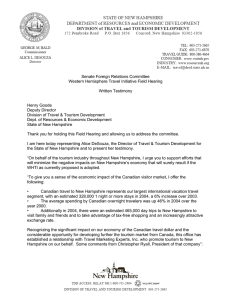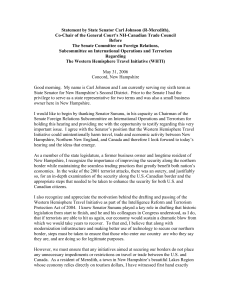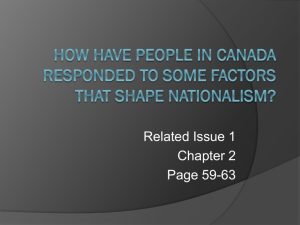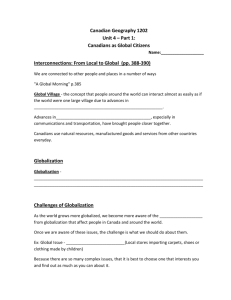Senate Foreign Relations Committee Western Hemisphere Travel Initiative Field Hearing Written Testimony
advertisement
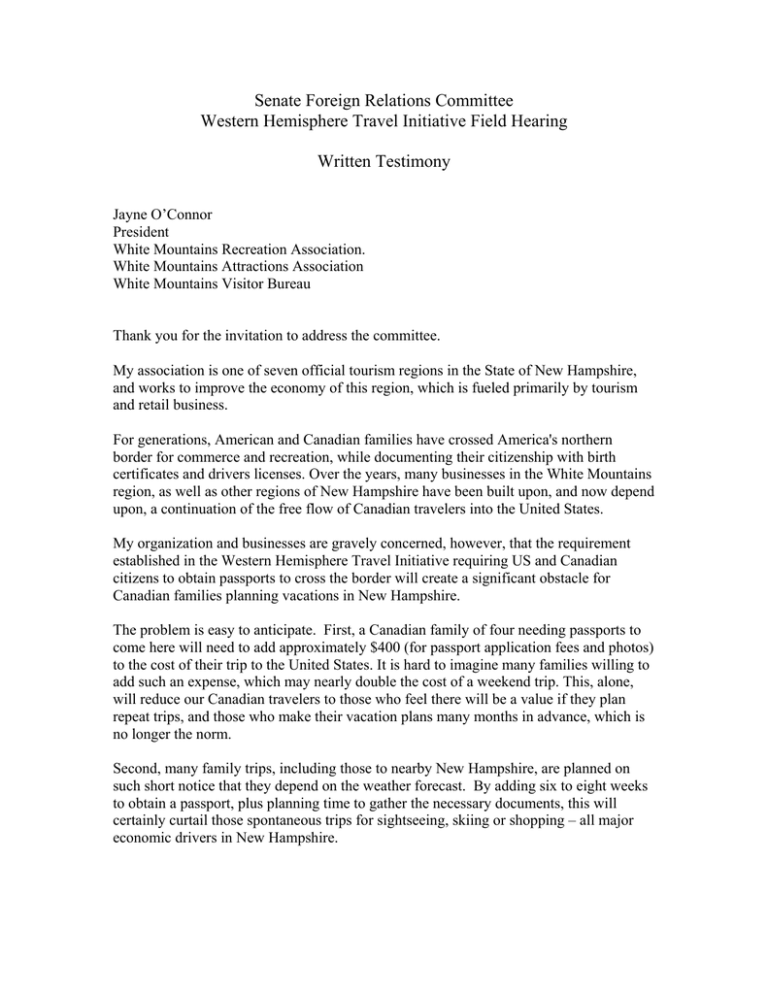
Senate Foreign Relations Committee Western Hemisphere Travel Initiative Field Hearing Written Testimony Jayne O’Connor President White Mountains Recreation Association. White Mountains Attractions Association White Mountains Visitor Bureau Thank you for the invitation to address the committee. My association is one of seven official tourism regions in the State of New Hampshire, and works to improve the economy of this region, which is fueled primarily by tourism and retail business. For generations, American and Canadian families have crossed America's northern border for commerce and recreation, while documenting their citizenship with birth certificates and drivers licenses. Over the years, many businesses in the White Mountains region, as well as other regions of New Hampshire have been built upon, and now depend upon, a continuation of the free flow of Canadian travelers into the United States. My organization and businesses are gravely concerned, however, that the requirement established in the Western Hemisphere Travel Initiative requiring US and Canadian citizens to obtain passports to cross the border will create a significant obstacle for Canadian families planning vacations in New Hampshire. The problem is easy to anticipate. First, a Canadian family of four needing passports to come here will need to add approximately $400 (for passport application fees and photos) to the cost of their trip to the United States. It is hard to imagine many families willing to add such an expense, which may nearly double the cost of a weekend trip. This, alone, will reduce our Canadian travelers to those who feel there will be a value if they plan repeat trips, and those who make their vacation plans many months in advance, which is no longer the norm. Second, many family trips, including those to nearby New Hampshire, are planned on such short notice that they depend on the weather forecast. By adding six to eight weeks to obtain a passport, plus planning time to gather the necessary documents, this will certainly curtail those spontaneous trips for sightseeing, skiing or shopping – all major economic drivers in New Hampshire. The WHTI, as written, is an economic disaster waiting to happen to the tourism industry in many states, and particularly the northern border states, all of which will certainly lose more Canadian visitors than they can afford. Tourism in general was significantly impacted by the events of 2001, with most businesses reporting decreases of 30% or more, and lasting 18 months or more. It has been a struggle to come back from the economic impact. Canada is our largest tourism market outside the United States. Recent adjustments in the exchange rate have once again made the U.S. an affordable destination for Canadian visitors, and has spurred companies here to invest in marketing and advertising to Canadians in the hopes of stabilizing the market, once more. My organization has raised money to bring travelers from Toronto, Montreal and the Maritime Provinces, and has worked hard to make new contacts and relationships with Canadian sales partners. This investment stands to be lost or greatly diminished if the WHTI goes into effect as written, and the convenience factor for travel to the United States is gone. This will cause the United States to become less competitive in the travel and tourism market, and the tourism businesses of New Hampshire and the other border states will pay a significant and disproportionate toll. To put some numbers on it: Estimates in the U.S. are that one in twelve Canadians will stay home following implementation of the WHTI, as written, resulting in a loss to the U.S. in Canadian spending of $500 million a year. (The Western Washington Center for Business and Economic Research) However, Canadian estimates put that number higher, at an anticipated $785 million lost by 2008 if the WHTI requirements are not amended. (The Conference Board of Canada) In addition, a poll of Canadians and Americans on both sides of the border by Zogby International, has concluded that 55% of the 60% of Canadians who do not presently have passports will not get them. This suggests that, in actuality, one in three Canadians will stay home, four times the original estimate, and that the reduction in spending will be far, far higher (perhaps four times higher) than a half a billion dollars a year. This is getting serious, and what is seriously needed is a mitigation of the effects of the WHTI on the economies of the Border States. The solution may be to cap the cost of an alternative border crossing document at $25, as has been suggested, and to exempt children, or at a minimum, waive the fee for children (who generally do not possess passports, but who are part of every “family trip”). Additionally, a delay of at least 18 months is needed to create and distribute the alternative documents in the United States and Canada, and to install the technology to read the cards at the border. All of these would help moderate the affects of the change and preserve the free flow of legitimate traffic across the border without compromising national security. Canada is expected to put in place reciprocal legislation to allow Canadians to go to the United States. This should be addressed in any amendment to the WHTI. The affects will be palpable in New Hampshire, where travel and tourism is the second largest industry, and especially in the White Mountains, where tourism is the main economy. The businesses of the Mount Washington Valley around North Conway depend on Canadians who make spontaneous shopping trips to the dozens of outlet stores that rely on the influx of visitors. The result will be a ripple that will depress the economy of all businesses in the region. None of these alternatives is good news for any New Hampshire business, in or out of the tourism industry. This problem is going to be very real, and very disturbing to the businesses in the White Mountains region that I represent, and for whom a continuation of the free flow of Canadian visitors can be the difference between red and black ink, extinction or survival. On behalf of my the businesses in the White Mountains, I urge you to support efforts to mitigate the effects of the implementation of the WHTI on the border states by reducing the cost of border crossing documents to a nominal level, and exempting or waiving the cost for children, most of whom do not have passports but who are part of every family vacation, and by delaying implementation for at least 18 months until technical issues can be resolved. Thank you.

